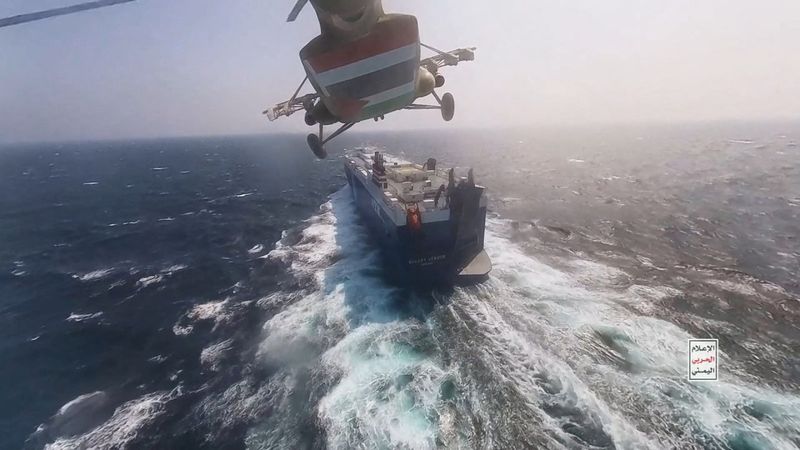War risk insurance rates edge up after surge in Red Sea ship attacks

Houthi military helicopter flies over the Galaxy Leader cargo ship in the Red Sea in this photo released November 20, 2023. Houthi Military Media/Handout via REUTERS
By Jonathan Saul
LONDON (Reuters) — War risk insurance premiums edged up for Red Sea voyages after three vessels were attacked in the area on Sunday and fears grow over worsening perils for commercial shipping, maritime and insurance sources said on Monday.
The incidents are the latest in a series of attacks in Middle Eastern waters since a brutal war between Israel and the Palestinian Islamist group Hamas broke out on Oct. 7.
The three commercial vessels came under attack in international waters in the southern Red Sea, the U.S. military said on Sunday.
Yemen’s Iran-backed Houthi group claimed drone and missile attacks on what it said were two Israeli vessels in the area.
«It has now become clear the Houthis will attack anything at sea with links to Israel or Israelis, regardless of how feeble the links may be, and regardless of the potential for collateral damage to non-Israelis, for example crew members,» Jakob Larsen, head of maritime safety & security with shipping association BIMCO, told Reuters.
Israeli military spokesperson Rear Admiral Daniel Hagari said the two ships cited by the Houthis had no connection to Israel. U.S. Central Command said the three vessels were connected to 14 separate nations.
Larsen said the industry would welcome a strengthened naval presence in the area.
«Faced with a threat from military formations such as the Houthis, merchant ships rely on protection from naval units,» he said.
«There is little a merchant ship can do to protect itself against weapons of war. Re-routing away from the area is a valid consideration, especially for ships at heightened risk.»
LONGER ROUTES
Israeli container line Zim said last week it was diverting some of its vessels away from the area, meaning longer journey times, as a temporary measure.
The London insurance market has listed the southern Red Sea among its high risk areas and ships need to notify their insurers when sailing through such areas and also pay an additional premium typically for a seven-day cover period.
Insurance industry sources said that war risk premiums had stayed firm on Monday at between 0.05% to 0.1% of the value of a ship, from around 0.03% estimated last week before the attacks. This translates into tens of thousands of dollars of additional costs for a seven-day voyage.
Transportation costs in this region are expected to rise further, said Corey Ranslem, CEO of British maritime risk advisory and security company Dryad Global.
«The escalation in insurance premiums will contribute to higher costs,» he said.
«Additionally, the increase in perceived risk may lead to a significant number of vessels opting to by-pass the region altogether, preferring longer routes such as circumnavigating the Horn of Africa.»
The U.S. military said on Sunday it would «consider all appropriate responses in full co-ordination with its international allies and partners».
Ships sailing under the Bahamas flag registry have been among the vessels hit in the various attacks.
The Bahamas delegation told an already scheduled assembly session of the U.N. shipping agency in London on Monday that what was emerging was a «deliberate attack on international shipping» in a critical region.
«Whether you are directly involved in this aspect, all of us eventually pay for it — every nation that depends on international shipping,» the Bahamas delegation said.
In January, shipping associations scaled back risk assessments in the Indian Ocean, which the Rea Sea leads into, after Somali piracy was brought under control.


